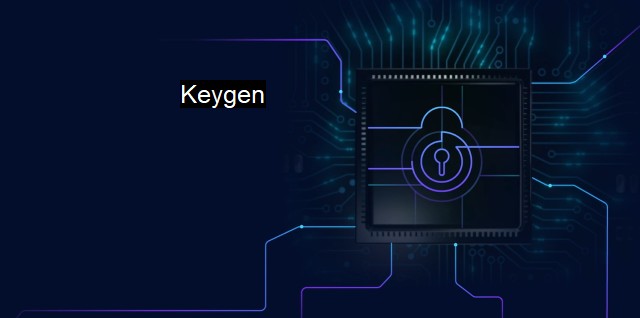What is Keygen?
Exploring the Dark Side of Keygens: The Evolution and Cybersecurity Implications of Activation Code Generators
Keygen, short for Key Generator, is a software program typically utilized by both legitimate users and cybercriminals to create serial numbers or license keys to activate software applications. In the cybersecurity and antivirus spheres, the conversations around Keygen are mixed, with the discussions spanning software piracy, hacking, invasion of systems, cyber threats, legality debates, and network protection.At its core, a Keygen generates valid licensing keys or serial numbers required by software applications primarily for two reasons - to combat software piracy by proving that the software was legally purchased, and some companies use it to make timely software upgrades and improvements viable.
The protocol behind its usage raises critical questions around the legality and risk, or lack thereof. Generating keys do not involve altering the application software; therefore, technically, it isn't software cracking; it is piracy. When someone uses a Keygen to authenticate a software application installation without making a purchase, it's considered illegal because it's against the software license agreement.
The discourse doesn't end at piracy. A common inclination for individuals who don't wish to pay for software might lead them to seek keygens online, not knowing the risks that come about from this activity. Several websites offer these solutions, but they often contain malicious software posing significant cybersecurity threats. In many cases, these individuals are inadvertently installing viruses, malware, and trojans into their systems under the guise of keygens, which then run rampant, causing significant damage.
The scope of damage is extensive. Confidential information can be compromised, network security could be breached; the scope of damage is tremendous. Malicious programs potentially have the ability to replicate information, encrypt files, delete data or even damage operating systems. It's a significant threat, given the exponential rates of cyber-attacks and cybercrimes in the recent past.
Owing to such grave threats, Antiviruses often flag keygens as high-risk software even when they aren't inherently malicious. Leading antivirus companies, such as Norton, Kaspersky, AVG, and McAfee, automatically quarantine keygens as potentially harmful software. The keygens are considered a harbinger of possible threats because they often have harmful codes embedded in the software file. Cybercriminals increasingly camouflage harmful programs designed to expose systems' vulnerabilities in Keygens. Thus, the antivirus software points to the potential risks involved in keygen interception, if any.
On another note, software developers often fall prey to the unintended negative consequences of Keygens. Software developers rely heavily on purchasing software for meeting operational costs, research, product developments etc. When keygens become integral parts of the software community, their revenues suffer, causing financial distress to developers, eventually forgone investments on essential upgrades and innovations.
It is worth noting that not all keygens are evil. There are legal versions provided by software developers, particularly for software testers, to efficiently evaluate software applications. Also, some open-source communities employ keygens to bypass traditional licensing requirements and increase accessibility to software.
Keygens are double-edged swords in the realm of cybersecurity and antivirus. Adequate understanding, prudent practices and investing in comprehensive antivirus solutions can mitigate these cybersecurity threats posed by keygens. Users need to evaluate the potential risks involved, avoid run-ins with unknown websites, and stray away from illegal downloads. After all, in the increasingly complex world of cybersecurity, seemingly simple choices can prove consequential.

Keygen FAQs
What is a keygen?
A keygen is a program or tool that is used to generate a unique software license key or product activation key. It allows users to bypass software license restrictions and access the full functionality of the software without paying for it. However, the use of keygens is generally illegal and can pose a security risk.How does a keygen work?
A keygen uses complex algorithms to generate a valid license key for a specific software program. It typically involves reverse-engineering the software code to find a way to generate a key that will unlock its full functionality. This process can be time-consuming and requires advanced technical skills.Are keygens safe to use?
No, keygens are not safe to use. They may contain malware, viruses, or trojans that can harm your computer system. Moreover, the use of keygens is illegal and can result in legal consequences, such as fines or imprisonment.How can I protect myself from keygens and other malware?
To protect yourself from malware, you should use a reputable antivirus software that can detect and remove potential threats. You should also avoid downloading and installing software from untrusted sources, as they may contain malicious code. Finally, you should keep your operating system and software up-to-date with the latest security patches and updates.| | A | | | B | | | C | | | D | | | E | | | F | | | G | | | H | | | I | | | J | | | K | | | L | | | M | |
| | N | | | O | | | P | | | Q | | | R | | | S | | | T | | | U | | | V | | | W | | | X | | | Y | | | Z | |
| | 1 | | | 2 | | | 3 | | | 4 | | | 7 | | | 8 | | |||||||